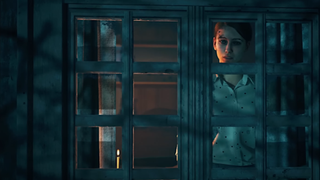Silent Hill: Ascension's proposed voting system makes it feel like a bizarre mass social experiment
The 'players' of the interactive series will be making judgement calls on some heavy subjects.

IGN shared an inside look at Silent Hill: Ascension, an experimental series that was announced last year. We've known you'll be able to choose the fates of its unlucky protagonists for a while. However, the full scope of these interviews has me feeling like I've stumbled across one of those unethical social experiments conducted in the '80s—and I can't decide if that's good or bad.
Silent Hill: Ascension is a collaboration between Genvid Technologies, Bad Robot Games, and Behaviour Interactive. Genvid Tech's Chief Creative Officer Stephan Bugaj describes it as "the next evolution of interactive television." He compares it to both Telltale games and Bandersnatch, a 'choose your own adventure' episode of Black Mirror, though there's one important twist:
"All of the [viewers] will interact with our series simultaneously ... everyone sees the same thing, everyone participates in the same decisions, and when those decisions are made, that's canon for everyone."
Bugaj also clarifies that the decisions will remain open from anywhere between a day and a week. Viewers who miss the episode will still be able to contribute, as long as they cast their ballot in time. It is, indeed, a fascinating twist on the formula—like bringing 'Twitch Chat Plays Pokemon' to a more controlled level. Also with less running around in circles, I assume.
I grow, however, more unsettled the more I dwell on Silent Hill: Ascension. My understanding of the series—backed up by Sharon Ingles, the lead writer and principal on the game—is that it's concerned with the more psychological aspects of horror. In their words, it's a "meditation on our human experience of trauma, guilt and fear".
"These are really flawed, broken people, these are people who've been through trauma, these are people who've traumatised others. Audience members get a chance to help arc these characters ... to redeem these characters, or push them deeper into their trauma."
This kind of worries me—which could be the point. If Silent Hill: Ascension winds up holding a dark mirror to the internet, it'll be an effective piece of horror in its own way. But the idea of a crowd playing judge and jury on characters with trauma—and the inevitable discussions of mental illness that entails—has me nervous.
The biggest gaming news, reviews and hardware deals
Keep up to date with the most important stories and the best deals, as picked by the PC Gamer team.
If I relate to a character because of their flaws, but the internet damns them, will I feel damned myself? An author creating an unempathetic portrayal of mental illness is one thing, but knowing that portrayal was agreed upon by a committee is another. It's something that will have to be handled with a deeply considerate touch for the themes the Silent Hill series likes to get into.
Currently however, I'm lost in the fog between thinking this is a really bad idea and finding it kinda genius. I'm definitely planning on keeping an eye out for the mark Silent Hill: Ascension leaves on its fans, and the fierce debates we'll likely be getting as a result of this experiment at play.

Harvey's history with games started when he first begged his parents for a World of Warcraft subscription aged 12, though he's since been cursed with Final Fantasy 14-brain and a huge crush on G'raha Tia. He made his start as a freelancer, writing for websites like Techradar, The Escapist, Dicebreaker, The Gamer, Into the Spine—and of course, PC Gamer. He'll sink his teeth into anything that looks interesting, though he has a soft spot for RPGs, soulslikes, roguelikes, deckbuilders, MMOs, and weird indie titles. He also plays a shelf load of TTRPGs in his offline time. Don't ask him what his favourite system is, he has too many.
Most Popular






